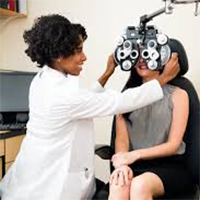What’s the difference between an Optometrist, Ophthalmologist and Optician?
An Ophthalmologist (MD) is a medical or osteopathic doctor who receives residency training and specializes in the diagnosis and treatment of eye diseases. Ophthalmologists use medical and surgical methods to treat eye diseases and vision disorders.
An Optometrist (OD) is a Doctor of Optometry that is a primary health care professional for the eye. Optometrists examine, diagnose, treat and mange disease, injuries, and disorders of the visual system, the eye, and associated structures as well as identify related systemic conditions affecting the eye.
An Optometrist completes a pre-professional undergraduate education at a College or University and then completes four years of professional education at a College of Optometry. Upon graduating, an Optometrist can complete an optional one year residency for additional training in a specific area of practice.
A Developmental Optometrist treats functional vision problems, including difficulties with binocular vision, eye movements and depth perception, as well as visual deficits following brain injuries. These optometrists are skilled in the use of lenses, prisms and optometric vision therapy and provide vision care based on the principle that vision can be developed and changed. Dr. Erin Case, OD, has been specializing in prisms for nearly 10 years.
We’re happy to recommend Ophthalmologists for surgeries after our Optometrists general check-ups. But if you want a complete exam of your entire visual system, we would suggest you first start with a Functional Vision Test performed by our Developmental Optometrist.
An Optician is a technician trained to design, verify and fit eyeglasses, lenses and frames, contact lenses, and other devices to correct eyesight. They use prescriptions supplied by Ophthalmologists or Optometrists, but do not test vision or write prescriptions for visual correction. Opticians are not permitted to diagnose or treat eye disease.
Our vision is highly important. We all depend on our sight in more ways than you may realize. Our ability to work, play, drive, or even recognize a face can be drastically affected without healthy vision. High blood pressure, diabetes and other health issues can affect your eyesight.
Source: Various


